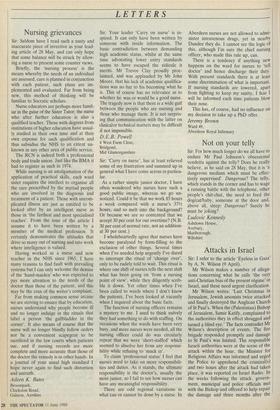Sir: 'Carry on nurse', has at least relieved some of
my frustration and summed up in general what I have come across in particu- lar.
As a rather simple junior doctor, I have often wondered why nurses have such a good public image, whereas we go un- noticed. Could it be that we work 85 hours a week compared with a nurse's 371/2 hours, and so melt into the background? Or because we are so contented that we accept 30 per cent for our overtime? (N.B. 30 per cent of normal rate, not an addition- al 30 per cent.) I wholeheartedly agree that nurses have become paralysed by form-filling to the exclusion of other things. Several times when I've needed help urgently I've dared to interrupt the ritual of 'change over', only to be rudely told to wait. This ritual is where one shift of nurses tells the next shift what has been going on 'from a nursing point of view', while they diligently scrib- ble it down. Yet other times when I've been called to wards where I don't know the patients, I've been looked at vacantly when I inquired about the basic facts.
The function of nursing officers remains a mystery to me. I used to think naïvely they had something to do with staffing. On occasions when the wards have been very busy, and more nurses were needed,•all the nursing officer could do was circularly repeat that we were 'short-staffed' which seemed to absolve her from any responsi- bility while refusing to 'muck in'.
To claim 'professional status' I feel that nurses need to take on more responsibili- ties and duties. As it stands, the ultimate responsibility is the doctor's, usually the most junior, so I fail to see how nurses can have any meaningful responsibility.
There are odd regional variations in what can or cannot be done by a nurse. In Aberdeen nurses are not allowed to admi- nister intravenous drugs, yet in nearby Dundee they do. I cannot see the logic of this, although I'm sure the chief nursing officer, who made this rule up, can.
There is a tendency if anything new happens on the ward for nurses to 'tell doctor' and hence discharge their duty. With present standards there is at least some discrimination of what is important. If nursing standards are lowered, apart from fighting to keep my sanity, I fear I will be informed each time patients blow their nose.
This has, of course, had no influence on my decision to take up a PhD offer. Jeremy Brown
Ward 49, Aberdeen Royal Infirmary


































































 Previous page
Previous page